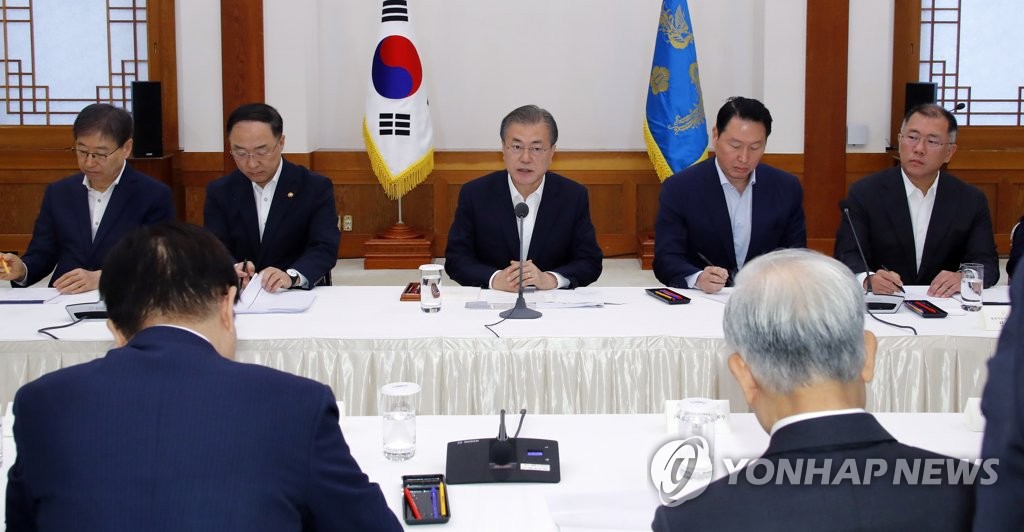President Moon Jae-in on Wednesday ratcheted up the pressure on Japan to stop heading toward a "dead end" with "politically motivated" export restrictions against South Korea.
Speaking at a meeting with dozens of local business leaders at Cheong Wa Dae in Seoul, he stressed that the government is doing its best for a diplomatic resolution to the problem.
"I hope the Japanese government will respond to it," Moon said. "I hope it will no longer go toward a dead end."

Moon presses Japan to halt export curbs before reaching 'dead end'
He pointed out that Japan has taken the measure to damage the South Korean economy for political purposes, even groundlessly connecting it with sanctions on North Korea.
The move is "never desirable" for friendly ties and security cooperation between the two nations and is harmful to their economies and the global economy, Moon added.
He made it clear that his administration will push for international cooperation to cope with Japan's action, while preparing for every possibility, such as a drawn-out bilateral trade standoff.
Moon hurriedly arranged the meeting with the heads of major conglomerates here to discuss ways to handle the emergency situation.
The leaders of 30 firms, whose assets total 10 trillion won (US$8.5 billion) or more, were invited, including Samsung, Hyundai, SK, LG and Lotte, with representatives from four business associations also in attendance.
Samsung's heir apparent, Lee Jae-yong, who manages the world's largest memory chipmaker, and Lotte Group chairman Shin Dong-bin were absent, as they were on business trips to Japan. Other top executives from Samsung and Lotte joined the Cheong Wa Dae session instead.
Last week, Japan removed preferential treatment for the export of three key materials to South Korean firms in apparent protest against Seoul over its handling of the wartime forced labor issue.
The three items affected are fluorinated polyimides, used in smartphone displays, and photoresist and hydrogen fluoride, which are crucial in the chipmaking process.
Japanese exporters are required to apply for separate licenses for the shipment of the materials to South Korea, a procedure that could take up to 90 days. Previously, the Japanese government gave blanket approval.
Moon described the situation as an "unprecedented emergency situation."
President Moon Jae-in shakes hands with Hyundai Motor Co. Executive Vice Chairman Chung Euisun at Cheong Wa Dae in Seoul on July 10, 2019. (Yonhap)
He raised the need to establish a "government-civilian emergency response system" for standing communication between the authorities and the corporate sector.
He said the government will actively support the diversification of import channels and domestic production of core industrial materials.
He also vowed administrative support for minimal customs procedures and the allocation of more funds to help firms accelerate technological development.
Over the longer term, Moon said, South Korean companies need to rely less on imports for the supply of major technologies, materials and devices.
He said the government will mobilize all available resources, including tax benefits and financing, to back the initiative by relevant companies, especially conglomerates.
During the two-hour session, which was not open to the public except for Moon's opening remarks, a businessman suggested South Korea expand partnerships with Russia and Germany for the supply of chemical materials as a way to curtail reliance on Japan, according to Cheong Wa Dae spokesperson, Ko Min-jung. There was also talk of considering aggressive mergers and acquisitions in "strategic component and material industries" to facilitate the development of original technologies.
Another participant asked the government to lift financial regulations in an "epoch-making" manner, saying an excessive amount of capital is parked in a "stable investment" field away from industrial and chemical materials development, Ko added.
A group of South Korean business leaders listen to President Moon Jae-in's remarks at a Cheong Wa Dae meeting in Seoul on July 10, 2019. (Yonhap)
The liberal-minded president has campaigned for a fair economy based on chaebol reform and co-prosperity between small and medium-sized enterprises and larger ones.
Amid growing economic woes and the latest trouble in trade with Japan, Moon and senior Cheong Wa Dae officials have been notably reaching out to conglomerates recently.
It was his first group meeting with the nation's business leaders at Cheong Wa Dae in half a year.
Its intention was to "listen to their opinions on recent economic situations and discuss methods for civilian-government cooperation," Cheong Wa Dae said.
Kim Sang-jo, presidential chief of staff for policy, attends a meeting with leaders of small and medium-sized enterprises (SMEs) in Yeouido, western Seoul, on July 10, 2019. (Yonhap)
Kim Sang-jo, presidential chief of staff for policy, had a separate meeting with representatives from small and medium-sized enterprises (SMEs) later in the day.
He said it is necessary for not just conglomerates but also smaller companies to play a role in efforts to foster independence in the supply of key materials.
"Recently, international trade circumstances including Japan's export restrictions, have been very uncertain and confusing," he said during the meeting at the headquarters of the Korea Federation of SMEs in Yeouido, western Seoul.
He called for more "flexibility and imagination" in finding ways for the government and civilian companies to cooperate in response to the predicament. (Yonhap)

